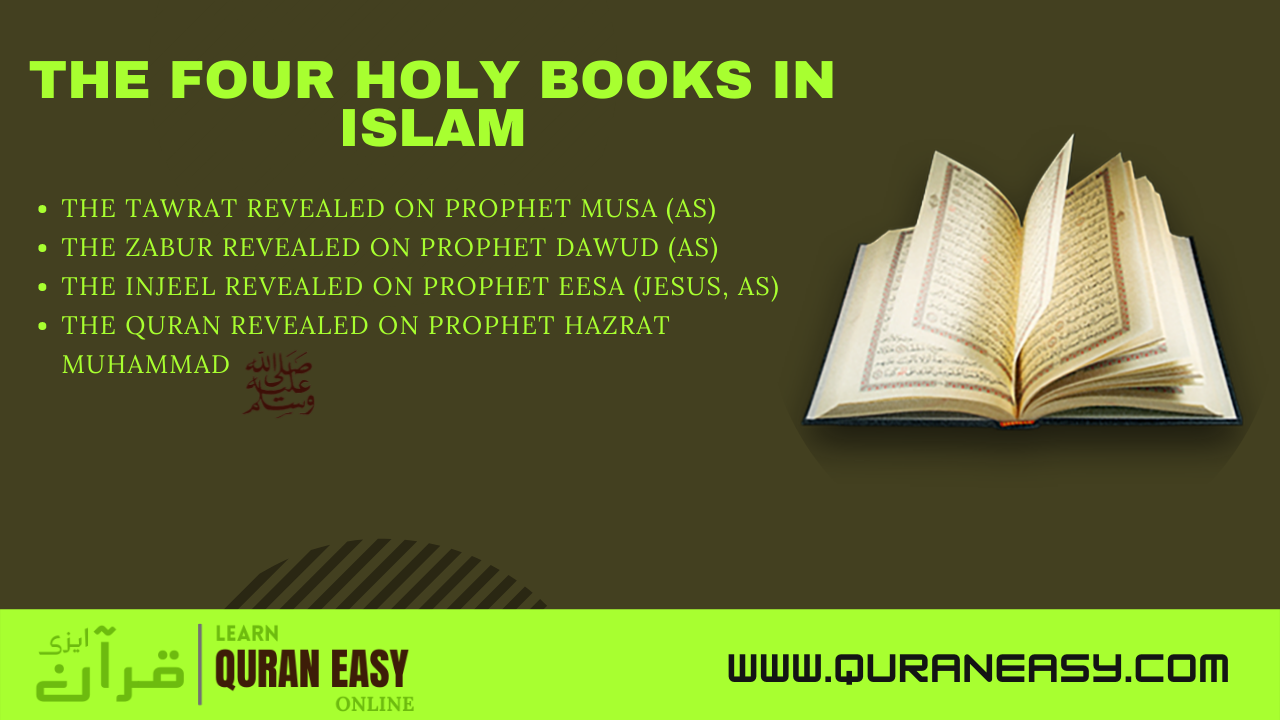What are the names of four Holy Books of Islam?
There are 4 holy books of Islam, which were revealed in the different eras on different Prophets:
- The Tawrat revealed on Prophet Musa (AS)
- The Zabur revealed on Prophet Dawud (AS)
- The Injeel revealed on Prophet Eesa (Jesus, AS)
- The Quran revealed on Prophet Hazrat Muhammad SAW)
What are the four Holy Books of Islam
As Muslims, we believe that Allah Almighty sent divine holy books on various Prophets for the guidance of mankind. Allah (SWT) bestowed the holy book of Islam on His messengers to spread Allah’s message throughout the world. The majority of Allah’s revelations have been lost or changed in some way. They’ve been mixed with folklore, legends, and personal desires to create something very different from what Allah (SWT) initially revealed. Therefore, the only book that can be relied upon is the Holy Quran that has remained in its original form and will remain so until the Day of Judgment. The 4 revealed Islam holy books in Islam are discussed below:
The Tawrat
This is the revelation that Almighty Allah sent down to Prophet Musa (AS). The Tawrat is a holy book that refers to the “Law” in the Quran, particularly, the Law of Moses. The Tawrat is frequently associated with the Torah of the Jewish faith or the Old Testament of the Christian faith. Unfortunately, the original text of this holy book has been lost. In the holy Quran, Allah Almighty says about Tawrat as:
“Verily, We did send down the Torah [to Musa], therein was guidance and light, by which the Prophets, who submitted themselves to Allah’s Will, judged the Jews. And the rabbis and the priests [too judged the Jews by the Torah after those Prophets] for to them was entrusted the protection of Allah’s Book, and they were witnesses thereto. Therefore fear not men but fear Me (O Jews) and sell not My Verses for a miserable price. And whosoever does not judge by what Allah has revealed, such are the disbelievers.” (Quran, 5:44)
The Zabur
The Holy book, which was revealed to Prophet Dawud (AS), is known as the Zabur. This revelation came to Prophet Dawud (AS) in the form of a series of songs or chants; hence Zabur is the Arabic word that means “songs.” This holy book’s original text, like Tawrat, is no longer with us. Allah Almighty says in the Holy Quran:
“We gave the Zabur to Dawud,” Quran (Quran 4:163).
The Injeel
The Injeel is Allah Almighty’s holy book, which he revealed to Prophet Eesa (Jesus, AS). The word Injeel means “Gospel Book” or “The Gospel.” As they did with the Tawrat, many people make the mistake of claiming that the Injeel is the New Testament of the Bible. That is not the case, however. The actual text of Injeel, like many other Books of Allah (SWT), is no longer available. As a result, Muslims are prohibited from reading the altered holy books. The message of the Injeel is preserved in the Holy Quran.
Holy Quran (Final Islamic Holy Book)
The fourth and final book is the Holy Quran. Quran is the sacred book of Allah Almighty. The holy Quran is the sacred scripture of Islam. This is the most sacred of the three holy books, Torat, Zabur, and the Bible. In addition to these four Holy Books, other small Sahifas were revealed to other prophets. The Prophet Muhammad received the Holy Quran as a revelation at the age of 40, after 23 years of His prophethood was declared. The angel Gabriel revealed it to the Prophet Muhammad in the West Arabian towns, between 610 and 632, in Mecca and Medina.
Allah’s only book that is still available in its original form is the Noble Quran. In the Holy Quran, Allah Almighty promised that His message would be preserved forever, and this is still true 1400 years later of its revelation. The Quran we study today is the same as the one used over a thousand years ago. Because the Quran is written in Arabic, there is always a single, standardized version of it. The Holy Quran is Allah’s (SWT) final book, and its central message encompasses all of Allah’s holy books. Allah bestowed various names to the Holy Quran, including Kitab, Al-furqan, Kalam, Zikar, Huda, Shifa, and others.
What are Muslim books of faith?
Believing in the four holy books of Islam is the primary obligation of the Muslim. As a result, in Islam, the third article of faith is that Muslims must believe in all of Allah’s sacred holy Books. Allah says in Surah Al Baqarah that, “Those who believe in the Quran and previous revelations and a firm belief in the afterlife are righteous.” According to Muslims, God revealed holy books or scriptures to several of God’s messengers. The Quran was given to Muhammad (PBUH), the Tawrat to Prophet Musa (AS), the Zabur to Prophet Dawud (AS), and the Injeel to Prophet Eesa (A.S) are examples. Muslims believe that these earlier scriptures were divinely revealed in their original form but that only the Quran remains in its original form which was revealed to the prophet Muhammad (SAW).
Despite their differences, the core beliefs in all 4 books of Islam are the same. There is only one God, according to every text. Muslims believe that God sends prophets to teach ordinary people how to live according to God’s instructions. According to the four holy books of Islam, on the Day of Judgment, we will either end up in hell or paradise. Thus, each Islam holy book is essential to its people, and every Muslim is obligated to believe in it. While the four books are now quite different, they are all linked by the same message: God is eternally, infinitely one.
Conclusion
The three divinely revealed books that came before the Quran contained other things like, creation stories and prophecies. They also brought legal rulings on what was and was not permissible. These scriptures were revealed to people from different eras and places. They were tainted over time, but the sober parts that agree with the Quran can still be confirmed. Meanwhile, the Quran is addressed to the entire human race, superseding all previous revelations. As a result, people of all races and tribes are legally bound by it. Belief in the 4 holy books of Islam allows us to appreciate Allah’s Mercy because He sent messengers bearing messages of truth to the various peoples who inhabit the Earth, giving them every opportunity to embrace the truth and attain His Pleasure.





Leave A Comment